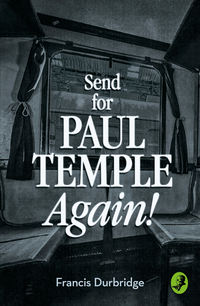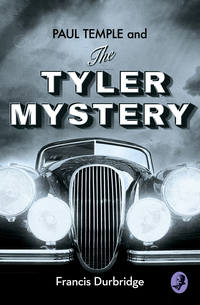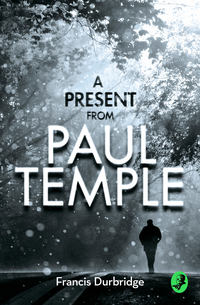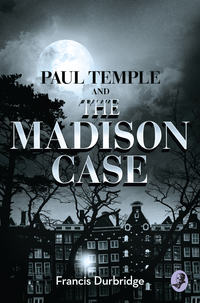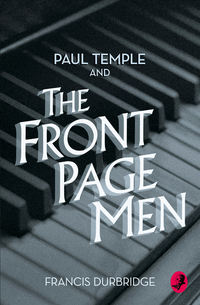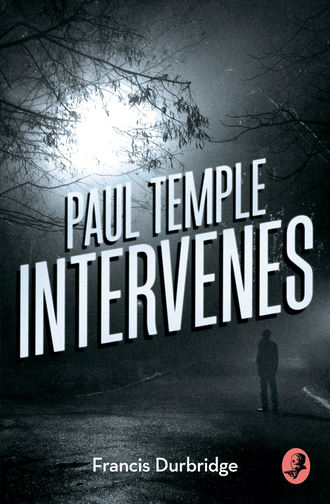
Полная версия
Paul Temple Intervenes

FRANCIS DURBRIDGE
Paul Temple Intervenes


An imprint of HarperCollinsPublishers
1 London Bridge Street
London SE1 9GF
www.harpercollins.co.uk
First published in Great Britain by
LONG 1944
Copyright © Francis Durbridge 1944
All rights reserved
Francis Durbridge has asserted his right under the Copyright,
Designs and Patents Act, 1988 to be identified as the author of this work
Cover design © HarperCollinsPublishers Ltd 2015
Cover image © Shutterstock.com
A catalogue copy of this book is available from the British Library.
This novel is entirely a work of fiction. The names, characters and incidents portrayed in it are the work of the author’s imagination. Any resemblance to actual persons, living or dead, events or localities is entirely coincidental.
All rights reserved under International and Pan-American Copyright Conventions. By payment of the required fees, you have been granted the non-exclusive, non-transferable right to access and read the text of this e-book on screen. No part of this text may be reproduced, transmitted, down-loaded, decompiled, reverse engineered, or stored in or introduced into any information storage and retrieval system, in any form or by any means, whether electronic or mechanical, now known or hereinafter invented, without the express written permission of HarperCollins.
Source ISBN: 978-0-00-812562-2
Ebook Edition © June 2015 ISBN: 978-0-00-812563-9
Version: 2015-06-05
Contents
Cover
Title Page
Copyright
CHAPTER I: On the Air
CHAPTER II: River Patrol
CHAPTER III: Crisis at Scotland Yard
CHAPTER IV: The Girl Who Knew Too Much
CHAPTER V: No Beer for Sammy Wren
CHAPTER VI: Roger Storey Explains
CHAPTER VII: Death Stalks Forard Glen
CHAPTER VIII: Sir Felix Entertains
CHAPTER IX: Kellaway Manor
CHAPTER X: The Marquis Sends a Warning
CHAPTER XI: Greensea House
CHAPTER XII: Accidental Death?
CHAPTER XIII: Paul Temple Keeps an Appointment
CHAPTER XIV: ‘The Clockwise’
CHAPTER XV: Above Suspicion
CHAPTER XVI: Superintendent Bradley Goes to The Pictures
CHAPTER XVII: Concerning Inspector Ross
CHAPTER XVIII: The October Hotel
CHAPTER XIX: Introducing The Marquis!
About the Author
Also in This Series
About the Publisher
CHAPTER I
On the Air
PAUL TEMPLE never failed to extract the utmost enjoyment from a trip to America; the inconceivable vastness of the continent with its astonishing gamut of civilisations appealed to his sensitive imagination. He was forever planning a novel of some considerable length dealing with the adventures of an Englishman in search of the hidden powers behind American life. So far, it was just an idea, just recognisable in the half-dozen random jottings in the notebook he invariably carried. And at the moment there did not seem to be much possibility of its materialisation into any substantial form. For Paul Temple was very busy indeed on his present trip to the United States.
It had started with an abrupt summons from Colonel Randall at the Ministry of Information. The Colonel had informed Temple that a few selected lecturers were being sent to the States in an effort to render that nation rather more ‘Britain conscious.’ It was essential that these lecturers should be known to the American public, and the M.O.I. had apparently been to some trouble to discover that the sale of Paul Temple’s novels in the States had long since passed six figures. Furthermore, a batch of newspaper cuttings had convinced them that the novelist-detective was also a man of action, who could be relied upon to use his initiative in any unorthodox situation.
So Paul Temple went to America. This time he took his wife with him, and when the lecture agency who made Temple’s arrangements discovered that Steve was also an author – of ‘The Front Page Men,’ which had enjoyed enormous popularity in the States, following the sensational reports of the activities of this gang of criminals in England – then Steve’s services were also very much in demand, and she was booked for a long series of lectures to women’s organisations of every description. So strange, indeed, were some of them that Steve felt that the association in question should be lecturing her on its peculiar origin.
However, Paul Temple and Steve ultimately arrived at Chicago. They marvelled at its luxury hotels, eyed its stockyards somewhat dubiously, walked the full length of the celebrated waterfront, and finally reached the luxurious portals of Station GSKZ, where Paul Temple was due to be interviewed on the air that evening by Cranmer Guest, whose reputation as radio’s ace interviewer conjured a thousand dollars from the pockets of his sponsors every time his programme went on the air.
This was the first time Temple had visited an American broadcasting station, though he had been on the air several times from the stately building that dominates Langham Place. Station GSKZ was a very different proposition however from the somewhat austere atmosphere of Broadcasting House.
It was five minutes to seven o’clock, and Paul Temple and Steve found themselves enveloped in the crowd which was surging through the foyer of the studios; it reminded the novelist of fighting for admission to a Hollywood premiere. There was apparently a theatre on the ground floor level, and a large notice near the door informed the visitors that the ‘Laughing Cavalier’ programme was to be broadcast from this particular auditorium at seven o’clock. Temple and Steve had some difficulty in avoiding being swept in with the mass of people who were presenting yellow tickets to the page-boy at the door. However, they eventually extricated themselves and headed for a desk in an opposite corner of the foyer which was marked ‘Information.’
The blonde in charge could best be described as ‘snappy’ in the more pleasant sense of the word.
‘Laughing Cavalier programme in the auditorium,’ she announced, mechanically before Temple could make any inquiry.
Temple smiled.
‘I’m sure the Laughing Cavalier is quite a delightful person to meet,’ he replied, urbanely, ‘but I doubt if we’d have much time for each other at the moment.’ The blonde raised her eyebrows almost imperceptibly and favoured him with a noncommittal stare.
‘Were you wanting to see someone?’ she asked.
‘Yes – a Mr. Cranmer Guest,’ replied Temple, casually.
‘Cranmer Guest? Oh, you can’t see him. He’s busy with his programme – goes on the air at nine,’ she quickly informed him.
‘I’m afraid Mr. Guest won’t go on the air at nine, unless I happen to be present,’ said Temple suavely. The receptionist took a quick glance at her copy of the programme schedule.
‘Say – you wouldn’t be Paul Temple?’
‘I usually manage to keep my appointments,’ he smiled.
‘Oh, I beg your pardon, Mr. Temple,’ she apologised, pushing in a plug on the nearby switchboard. ‘I’ll tell Mr. Guest right away.’
She spoke into the receiver, and presently announced: ‘Mr. Guest will be right down.’
As Temple was turning away she reached for a pale blue envelope that lay in a pigeon-hole at her side.
‘Mr. Temple, this message came for you over short-wave from London. It’s been sent on from New York.’
Temple scrutinised the envelope, then thrust it into his pocket. He was just moving away when he turned and asked the girl: ‘Supposing there’s an answer to this – can I send it from here?’
‘Sure thing,’ she smiled. ‘We’ve got a special short-wave service here for priority stuff; it’s working day and night.’
‘Whatever can it be, darling?’ Steve asked as they sat down on a settee near the information desk.
‘I expect it’s in code – it’ll have to wait till after the broadcast,’ he replied, as a thickset man with a very large head, slightly crooked nose and a mobile mouth came towards them.
He exchanged a glance with the receptionist, then addressed Temple.
‘Welcome to GSKZ, Mr. Temple.’
Temple rose and shook hands, then introduced Steve.
‘This is a pleasure,’ said Cranmer Guest with a disarming smile. ‘Shall we go up to my office?’
‘Would you like me to wait here?’ interposed Steve.
Guest waved aside the idea.
‘Certainly not, Mrs. Temple. We have a comfortable lounge and restaurant upstairs. Come along with us – and after the broadcast I’ll show you round.’
He led the way to the elevator, past the doors of the auditorium, now closed, through which came the very faint strains of a popular dance tune.
The elevator stopped on the fourth floor, and Guest led them down a broad corridor containing numerous signs: Studio 4A, Control, Studio 4B, Artistes’ Room, Announcers, News Room, Lounge and Restaurant. They saw Steve settled with a magazine and a cup of coffee, then went into Guest’s office, which had his name painted on the door in small black letters.
‘This is Miss Wharton, my secretary – Mr. Temple,’ announced Guest as they entered the room, and a dark, intelligent girl looked up from her typewriter. ‘Now Lesley, here’s another rush job. Take down Mr. Temple’s answers to my questions and let’s have your copies right away. We’re on the air in’ – he looked at the wall clock – ‘less than two hours.’
Without any further ado, Guest began to fire questions at his visitor. They were chiefly concerning Temple’s crime experiences. The questions were shrewd and, in an indirect manner, displayed a considerable knowledge of the subject. But Guest was not interested in airing his own knowledge. He let Temple go on talking as long as he wished; then after about half-an-hour’s conversation, during which the secretary had busily filled several pages of her notebook, Guest sighed in some relief.
‘There, I think that’s about all, Mr. Temple. I think this should make just about the best interview I’ve tackled this year. Glad the network’s taking it.’ He paused, then added as an afterthought: ‘Oh, just one more question. Do you know anything about this person who calls himself The Marquis?’
Temple shook his head.
‘Only what I’ve read in the papers. His – er – activities seem to have come to light since I sailed.’
‘H’m,’ murmured Guest, ‘the police over there don’t seem to be making much headway. The fellow just commits one murder after another and, so far as I can make out, gets away with it. You ought to see the headlines in a batch of English papers I received yesterday.’ He paused, then added curiously: ‘I suppose Scotland Yard haven’t sent for you by any chance?’
Temple smiled. ‘Not to my knowledge,’ he replied, in some amusement.
‘Oh well,’ shrugged Guest, turning to his secretary. ‘That last question’s off the record, Lesley.’
As quickly as Miss Wharton typed out the contents of her notebook, Guest and Temple went through them, deleting a sentence here and there, adding an occasional explanatory phrase, sometimes re-writing a whole paragraph. When they had finished, Guest read through the final version with a stopwatch in his hand, and discovered that they would over-run by two minutes. So another question and answer were cut out. The final result was passed back to Miss Wharton to make a final draft.
Guest stood up and stretched himself.
‘Twenty-five minutes before we’re due on the air. Time for a cup of coffee with Mrs. Temple,’ he announced, offering Temple a cigarette.
In the lounge, a loudspeaker, turned right down, was playing dance music which was being broadcast at that moment on a network programme from New York. Just as they had joined Steve, a breathless young man in an open shirt came up to Guest.
‘Same layout, Cran?’ he asked.
Guest nodded.
‘Twelve minutes,’ he replied. ‘One minute commercial to start and finish, and the introduction for Mr. Temple I gave you this morning.’
The young man smiled at Temple.
‘This is Harvey Lane, one of our announcers – Mr. and Mrs. Temple,’ Guest introduced them briefly. Lane chatted pleasantly for a minute, then made a hurried departure.
‘Never a minute to breathe, poor devils,’ commented Guest, stirring his coffee. ‘Oh well, we’ve all had to go through it – station breaks, forenoon plugs, lunchtime commercials – it’s all in the game.’
Temple and Steve exchanged a smile.
‘How’s it going, darling?’ she asked.
‘I shan’t be sorry to see the clock pointing to nine-fifteen,’ he admitted, dryly.
‘Perhaps Mrs. Temple would like to come in the studio,’ suggested Guest.
Steve shook her head. ‘I’d much sooner listen in here,’ she declared.
At ten minutes to nine, Guest led the way into a small studio, where the main object of furniture was a flat-top desk with two microphones on it. There was a chair in front of each microphone, and on the opposite wall was a large clock with a red second hand slowly moving round the dial. Under the clock stood a large window commanding a view of the control room, complete with its gramophone turntables and banks of meters.
At one minute to nine, after Temple and Guest had settled themselves comfortably in their chairs, Miss Wharton rushed in with the completed scripts.
Guest began glancing through his copy. ‘Plenty of time to look through it,’ he told Temple, as the announcer came in and took his stand in front of a microphone.
The engineer behind the glass panel held up his hand. Ten seconds to go. Temple had always found these last few seconds before a broadcast completely awe-inspiring. One hardly dared to breathe. It was as if some world-shattering event, like the downfall of an empire, was due to take place at the split second of nine o’clock.
There was the sound of a distant fanfare of trumpets – played on a record in the Control Room – and the engineer dropped his hand. Harvey Lane faced the microphone squarely.
‘The Pan-American Fruit Combine brings you the Cranmer Guest programme!’ he announced impressively …
They finished promptly at nine-fourteen, and following a significant jerk of Guest’s head, Temple rose and joined him outside the studio.
Steve rose to meet them as they came through the door.
‘I’d no idea I had married such an accomplished actor,’ she smiled. ‘You both sounded extremely professional.’
‘Forget it!’ said Temple laconically, and Cranmer Guest laughed. ‘Care to take a look round while you’re here?’ he offered, and proceeded to conduct them over the large building, where Steve was particularly impressed by the News Rooms with their tape machines ticking busily and sub-editors frowning beneath gaily coloured eye-shades.
When they stood in the foyer once again amid a crowd queuing up for the ‘Southern Skies’ programme, billed to take place at ten-fifteen, the Temples shook hands with Guest and bade him good night.
‘Where to now?’ asked Steve as Temple summoned a taxi.
‘A little speakeasy I used to know in Prohibition days,’ he told her. ‘Rather a cosy little place – they used to call it Maisie’s Craze.’
He gave this name to the taxi-driver who shook his head.
‘Maisie don’t live there any more, brother. They call it the Appenine Club these days.’
‘All right,’ agreed Temple. ‘Take us there.’
But the Appenine Club proved disappointing, at any rate to Temple.
‘It isn’t the same without Maisie,’ he sighed regretfully, as they sat eating an indifferently cooked supper. He turned to the waiter who was uncorking a bottle of wine.
‘What’s happened to Maisie?’ he asked.
The waiter shrugged. ‘Last time I heard of her she was in New York, singing at the Three-Fifty.’
‘Who is this Maisie, anyway?’ asked Steve.
‘Oh, just a friend of mine,’ replied her husband, with an indifference that would have intrigued any woman.
‘Did you know her very well?’ persisted Steve.
‘Quite well! She was a very human sort of person. We had a lot of fun together in the old days.’ Steve noted the distant light in his eyes, and was more curious than ever. But she managed to restrain her curiosity, and after witnessing a very second-rate cabaret act, they returned to their hotel. It was not until he was taking off his coat to put on a dressing-gown that Temple remembered the blue envelope he had thrust in his pocket. He took it out and examined it, then carefully slit open the flap. Inside, there was a piece of blue paper headed ‘Station GSKZ. Special Short-Wave Message transmitted from London, England.’ The message itself, though short, was in code.
Temple picked up his keys and unlocked his travelling trunk. He pressed one of the studs on the outside and a part of the side of the trunk snapped back. From the half-dozen miscellaneous articles Temple chose a tiny notebook. With the book’s help he decoded the message in rather less than two minutes. It ran:
*
‘Request immediate return to assist investigation of the Marquis murders. Cartmell. Home Secretary’s Office.’
Temple was just returning the code book to the trunk when the bedside telephone buzzed.
‘This is Jefferson, Programme Supervisor, GSKZ,’ said a strange voice when Temple had spoken. ‘Mr. Temple, we all liked your little talk tonight. I was dining with J. C. Marriman – he was very much impressed and asked me to invite you to take part in his company’s “Grand Parade” programme tomorrow at eight.’
‘I’m sorry,’ said Temple definitely.
‘But look here, Mr. Temple, if it’s a question of money, I know J.C. will be quite willing to—’
‘No, no,’ interposed Temple. ‘I’d have been glad to help you, Mr. Jefferson, but it just isn’t possible. I have other plans.’
The Programme Supervisor pleaded for some minutes, but Temple remained firm, and finally he rang off. As he replaced the receiver, Steve asked: ‘Darling, what are your other plans?’
Temple flung himself into an armchair and lighted a cigarette.
‘I’m afraid this is very sudden – upsets our trip. But it just can’t be helped.’
‘Is it something to do with that message you’ve just read?’ she inquired. He nodded.
‘By Timothy, that reminds me, I must send a reply.’ He went to retrieve his code book, then hesitated. ‘No,’ he decided, ‘I’ll do it in the morning before we start.’
‘Start? Where to?’
He blew a cloud of smoke into the air. ‘Back to England, Steve,’ he announced calmly.
*
It was fortunate that Steve’s experience as a reporter had accustomed her to acting swiftly, and she was up before six-thirty the next morning packing and sending telegrams to secretaries and organisers who were expecting them to lecture at their various gatherings.
At ten o’clock Temple left her still busily occupied, and, having translated his message into code, strolled round to the broadcasting station, to find that the blonde at the information desk had been replaced by a red-head who was even smarter on the uptake.
‘Oh Mr. Temple, it’s a real thrill to meet you in person,’ she blithely informed him. ‘I heard you on the air last night. Say, I do like your voice – it’s so English.’
Temple smiled his acknowledgment, then stated his errand.
‘I understand I can send a code message from here on the short-wave to England.’
‘That’s right,’ she agreed. ‘But talking of code messages, there’s one waiting here for you.’
‘I got it last night, thanks,’ he replied, politely.
‘Oh no you didn’t,’ she insisted. ‘It only came through this morning just after I signed on.’
Without further ado, she handed him another blue envelope. Temple surveyed it in some bewilderment.
‘I think I’d better postpone sending my message until I find out what’s in this,’ he decided at last, and, bidding the receptionist a pleasant good morning, returned to his hotel.
Steve was just putting the finishing touches to their packing when she noticed him puzzling over the flimsy.
‘What’s the trouble, Paul?’
He shook his head. ‘I can’t make this out,’ he admitted. ‘The message is in the secret Home Office code: yet it comes from a complete stranger.’
‘Does it make sense?’
He passed over the slip of paper, and Steve read:
I’ll be expecting you, Mr. Temple – The Marquis.
CHAPTER II
River Patrol
SERGEANT RUPERT JOSIAH CARRINGTON BRIGGS skilfully guided the narrow police launch through the churning wake of an overloaded tramp steamer and past the gaunt cranes and warehouses which were dimly silhouetted against the heavy night sky. There came the distant rumble of a storm somewhere beyond Greenwich, and a gust of wind rippled across the water, bringing a scurry of raindrops in its train.
Briggs had the heavy jowl of a typical Yorkshireman which gave the effect of an almost perpetual frown, particularly when he was steering the launch with the aid of a single heavily shielded headlamp.
He shivered and tightened the strap of his sou’wester.
‘If this is the Thames,’ he declared, in an embittered tone, ‘you can have it!’
A broad grin split the Cockney features of his companion, Sergeant Hanmer, who had been born within the sound of the river traffic, and had an extensive knowledge of the famous waterway in all its moods. No aspect of the river which carried such a strange assortment of cargoes ever seemed to disturb Hanmer. He began to fasten up his oilskins as he observed cheerfully: ‘I told you to look out for a bit of real life on the old river!’
An empty crate bumped into the side and vanished in their wake. Briggs cursed softly and changed the course a fraction.
‘A hell of a night!’ he shuddered, as the shower of rain developed into a sudden torrent.
‘Not fit for a dog! Have to slow her down.’
‘If you go much slower, we’ll get swept away by the tide,’ chuckled Hanmer, who seemed to be enjoying himself. They were making about four knots by this time, and the rush of rain had obscured all sounds save the steady beat of the engine and the occasional hoot of a tramp steamer’s siren. The darkness seemed to have reached its maximum intensity, and Hanmer prepared his electric lamp ready for any emergency. Together, they steered unblinkingly through the sheets of rain. Once or twice, Briggs sounded his hooter in a tentative fashion. After a few minutes, the rain almost stopped and the sky lightened a little until they could see very faintly the dim outline of the right bank.
Sergeant Briggs shook the raindrops from his sou’wester and ruminated feelingly on the topic that was always in his mind at such moments as these. Had he been wise to turn down that offer of a job from his wife’s father? A nice, steady, nine-till-five job, with an office to himself and a chance of a partnership later on. If only it had been something a bit more exciting than dealing in grate polish! Still, there was a lot to be said for regular hours, leisurely meals, and slippers waiting at the fireside. Sergeant Briggs sighed wistfully.


